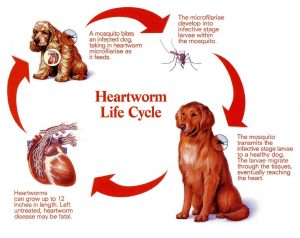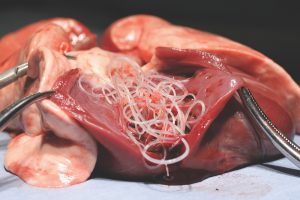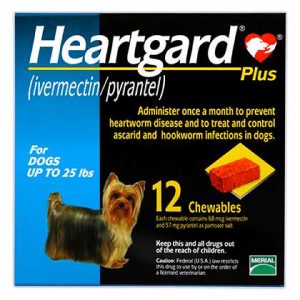A Reminder About Heartworm
A Reminder about Heartworm
Dr. LaHue, DVM, MPVM
April is heartworm prevention month, so if you haven’t had your dog on year-round prevention April is the time to start up for the summer. However due the warmer winters we’ve been having year-round prevention is recommended. This will help you understand the ins and outs of heartworm and prevention.
What is heartworm?
Heartworm disease is caused by a specific type of worm, called a filarid, that lives in the bloodstream of the host. The disease is transmitted by mosquitos. The most likely animals to be infected are middle aged medium sized dogs that live outside. However, all dogs are at risk and the disease even occurs uncommo
nly in cats. The mosquitos transmit small juvenile worms called microfilaria, which are microscopic. Maturation in the mosquito happens more rapidly in warm, humid environments. Once injected by the mosquito circulate in the blood stream where they end up in the heart and lungs and grow to adults. It takes about 6-9 months for worms to mature to adulthood where they can reproduce.
The disease
Adult heartworms living in the blood vessels and heart causes an inflammatory response and direct trauma that leads to scarring of the blood vessels and damage to the lungs. With more damage dogs, especially active ones, develop pulmonary artery hypertension. This make the heart have to work much harder and eventually they may develop congestive heart failure. More sudden disease can occur when worms die or there are enough to block blood vessels or cause severe lung damage to the point respiratory function is compromised.
Symptoms may be non-existent early after infection but may include: coughing (the most common), exercise intolerance, doing poorly, difficulty breathing, weakness, collapse, nose bleeds, swelling in the abdomen, and coughing up blood among others.
How is prevented?
Heartworm is prevented usually monthly treatments that kill any microfilaria present in the blood. Preventatives also have the advantage of killing intestinal parasites, keeping your dogs free of p
arasites. The main two we sell are Heartgard and Sentinel. Both are equally effective at preventing heartworm disease. Sentinel has the advantage of killing tapeworms as well, although some dogs don’t seem to like it as much. Tapeworms are generally not a problem if your dog is on a good flea preventative and is prevented from eating dead animals. Additionally the use of a flea and tick preventative with a repellant such as Vectra 3D can add an extra barrier of protection by preventing mosquito bites.
Why do I need to test yearly?
The main test for heartworm in dogs consists of an “Antigen” test that only responds to the presence of adult female worms, the presence of only microfilaria will give a negative result. We generally follow the American Heartworm Associations recommendation that all dogs get a heartworm test yearly, even those that are on year-round prevention. This is because there is a small rate of failure of the preventative. In addition, owners may forget to give it, or the dog might spit it out later, which would allow an infestation start. Additionally, while the preventative is less effective against adult heartworms if it kills off an adult heartworm there can be severe effects, including pulmonary embolism, cardiac failure, and death.
Cats and heartworm
While cats are much less likely to get heartworm, the disease can be much more severe. Even a single adult worm has the possibility of causing sudden respiratory distress and shock, to the point of death. Cats most commonly get a syndrome called HARD (Heartworm associated respiratory disease). Due to the fact that cats often have low numbers or only single worms the standard heartworm test performs poorly in cats. Thus cats suspected of having heartworm disease need both a standard “Antigen” test and an “Antibody” test to rule out heartworm infection.
What is the treatment for adult worms?
While treatment for adult worms can be intensive, it is also often successful. Initially if your pet has symptoms they will be stabilized. The treatment involves hospitalization and a drug that slowly kills the worms. Since adverse effects from dying worms may occur, hospitalization is necessary. If the number of worms is too great, surgery may be the only option. The good news is it is easy to prevent with a monthly chewable. Keep your dogs on heartworm preventative and prevent the heartache of treatment.




